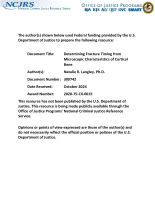Research centers
Taku Eyachantognaka Owihankeya Wanica, Workshop Presentation
Improving Outcomes for Child and Youth Victims of Commercial Sexual Exploitation: An Evaluability Assessment of the Love 146 Survivor Care Programs
Non-Contact Detection of Fentanyl and Other Opioids: Towards a Generalized Approach to Detection of Dangerous Drug Classes
Assessing Transgender Hate Crime Victimization and LGBTQ Liaison Unit Response
Research, Evaluation, and Analysis of Call Handling on Three-Digit Hotlines (REACH-3D)
NIJ FY24 Domestic Radicalization and Violent Extremism Research Center of Excellence
Just Recruiting Women in Policing
Webinar Transcript: FY 2024 NIJ Graduate Research Fellowship Program
Deadline notice
The deadline to submit an application under the solicitation discussed below has passed.
NIJ held a webinar on February 14, 2024, gave an overview of NIJ’s Graduate Research Fellowship opportunity, which invites applications for doctoral dissertation research that is relevant to preventing and controlling crime, advancing knowledge of victimization and effective victim services, or ensuring the fair and impartial administration...
States’ School Safety Centers: A Brief Look Into History, Characteristics, and Activities
The Structure, Services, and Products of State School Safety Centers
The Effects of Police Contracting on Crime: An Examination of Compton, California
NIJ co-sponsorship of the Center for Advanced Research in Forensic Science (CARFS)
NIJ FY24 Domestic Radicalization and Violent Extremism Research Center of Excellence
NIJ Multisite Impact and Cost-Efficiency Evaluation of Veterans Treatment Courts
Expanding Mental Health Diversion Opportunities: A Prospective Evaluation of the Los Angeles County Intake Booking Diversion Program
21st Century Criminal Defense Practice: An Examination of the Impact of Holistic Defense in Wayne County, Michigan
Building Better Indigent Defense Systems
NIJ FY23 Center for Enhancing Research Capacity (CERC) at Minority Serving Institutions (MSIs)
Inclusive Research: Engaging People Closest to the Issue Makes for Better Science & Greater Impact; 2023 NIJ Research Conference Plenary
This panel will discuss what inclusive research is, how to conduct it, and what issues and challenges exist about engaging in it. “Inclusive research” has its history as a participatory research method designed to ensure people closest to the issue or problem under study are authentically engaged in the research process rather than simply being “research subjects.” While community-based participatory research has begun to take on greater prominence in the criminal justice realm, such efforts are largely confined to qualitative research inquiries.
See the YouTube Terms of Service and Google Privacy Policy
2023 NIJ Research Conference Opening Ceremony
The theme of NIJ’s 2023 Research Conference was “evidence to action,” and our goal was to bring researchers and practitioners together to learn about the latest research evidence and how it can be implemented to promote safety, equity, and justice.
The opening ceremony included remarks from U.S. Attorney General Merrick B. Garland, Assistant Attorney General for the Office of Justice Programs Amy Solomon, and NIJ Director Nancy La Vigne.
See the YouTube Terms of Service and Google Privacy Policy





